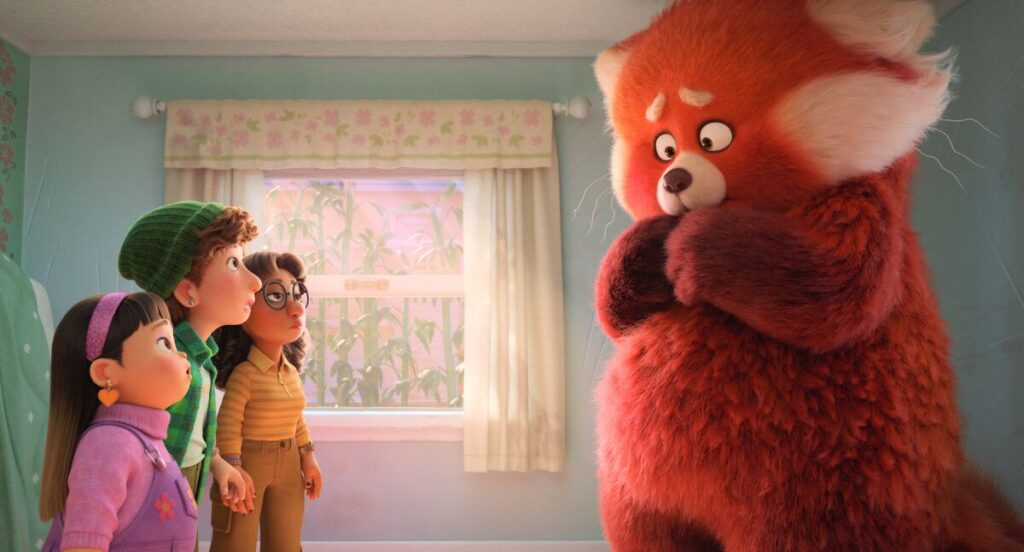Intrigued by the perils of puberty, writer-director Domee Shi put a uniquely whimsical spin on this physiological metamorphosis in her first animated feature, “Turning Red.”
“All of a sudden, you wake up and you’ve gone through a transformation overnight,” Shi mentions to The Envelope. “I wanted to figure out a way to explore that phenomenon we all go through but make it more appealing and entertaining than what happens in real life.”
To do so, the 33-year-old devised a fantastical metaphor where a 13-year-old Chinese Canadian girl, Meilin (voiced by Rosalie Chiang), poofs into a giant red panda whenever overwhelmed with emotion. That the fuzzy creature is native to China, where Shi was born, and that its color is associated with intense feelings, made it an ideal symbol for this magical coming-of-age.
Given the changes its adolescent heroine undergoes, “Turning Red” naturally features scenes dealing with menstruation, personal hygiene products and even one where Meilin goes into “a lusty drawing spiral under her bed” with a secret sketchbook. But as obvious as these topics seemed to Shi and the female leadership at Pixar, segments of the audience expressed their discomfort with those topics upon the film’s March release on Disney+.
“It came from an honest place. We were not trying to shock people,” Shi says. “It’s still taboo, because [people] just don’t see it enough in media. The more we talk about it in movies and TV shows, the more we can normalize it. It shouldn’t be a big deal at this point.”
As the first solo female director of a Pixar feature, Shi, more than ever, understands the relevance of having diverse perspectives supported and nurtured with major platforms.
“I feel the responsibility to hold the door open and keep momentum moving forward when it comes to tapping female filmmakers and filmmakers from different backgrounds and giving them the opportunity to tell their stories,” she adds.
In “Turning Red,” 13-year-old Meilin turns into a red panda when her emotions become overwhelming.
(Pixar)
For Shi, a key motivation to set “Turning Red” in the early 2000s, the period when she was a young teen, was to experience a boy-band concert vicariously through her excited characters. Although Shi’s parents never allowed her to attend a Backstreet Boys or ‘N Sync show, Meilin and her friends do make it to see 4*Town — the fictional group in the film.
“My classmates would come back from the concerts with merchandise, and they had a glow about them that I was so envious of,” Shi recalls. “I was like, ‘What happens at those concerts? It feels like they went in girls and they came out women. I want that.’” [Laughs]
Raised in Toronto, where her story takes place as well, Shi also cleverly pays homage to her Canadian identity with small onscreen details such as the color of the local currency or the fact that in parts of that country milk is sold in bags, not cartons. But more important, she wished to organically depict the enriching multiculturalism she grew up around.
“I wanted to make sure this was reflected in Mei’s friend group, but also in her school and in the population that we see as the background characters,” she says.
Stylistically, Shi describes her sensibilities as an amalgamation of her admiration for Walt Disney Animation and Pixar and her love for anime, including the works of master Hayao Miyazaki and series such as “Sailor Moon,” “Ranma 1/2” and “Inuyasha.”
“I wanted to create our own ‘Totoro’ for Pixar. That was the goal for Panda Mei,” she says. “I also love how expressive Japanese animation is. They exaggerate the features on the character’s faces to really emphasize a reaction, like shock, lust or anger. It felt like the perfect style to tell a story about a girl who feels her emotions so strongly.”
One of the most challenging subjects addressed in “Turning Red” is the persistence of intergenerational trauma in relationships between parents and children, specifically first-generation children of immigrants. This hurtful notion is also present in Daniel Kwan and Daniel Scheinert’s multiverse box-office hit “Everything Everywhere All at Once.”
In both titles, parents ultimately apologize to their kids. Shi believes this represents hers and the Daniels’ exploration of wish fulfillment and desire for family therapy.
“You can’t help but put what you are going through in your art. It makes sense that both of us touched on it,” Shi notes. “Intergenerational trauma is a hot topic amongst people of our generation and our background. There is no clear answer for it. Us working through the answer in what we do is our way of figuring it out ourselves.”
Now that “Turning Red” has reached viewers worldwide, many of whom have sent her adorable fan mail, Shi can finally muse on the experience of having won an Oscar in 2019 for her animated short film “Bao.” Although she appreciates the validation of receiving that honor, she recalls having to fly back home the day after the ceremony to get back to work.
“I didn’t feel like I inherited any filmmaking superpowers from the statue,” Shi says with a laugh. “It’s still very hard to make movies.”

